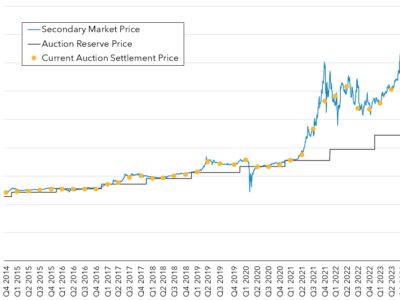“Murky” Resolution Vote
The Senate voted today on Sen. Murkowski’s resolution to halt EPA regulation of greenhouse gases. The resolution was defeated by47 to 53. What are we to make of the vote?
The resolution was offered under the Congressional Review Act, which provides a fast-track mechanism for Congress to override agency regulations. (The CRA, which was part of the Contract with America in the 1990s, is a substitute for the kinds of “legislative vetoes” that the Supreme Court has found to be unconstitutional. There’s a detailed discussion in this law review note.) You may recall that EPA’s endangerment finding was made after the Supreme Court held that, if climate change endangers human health or welfare, EPA has a duty to make a finding to that effect and to regulate greenhouse gases. In effect, the Murkowski resolution would amend the Clean Air Act to reverse the Supreme Court’s interpretation of the statute and exempt greenhouse gases from regulation.
David Doniger has posted a thorough analysis of Murkowski’s arguments. The attorney generals of 11 states also posted a letter opposing the resolution.
It seems plain that, despite her claims to the contrary, the resolution was aimed at preventing any action on climate change, whether by EPA or Congress, not just at shifting the decision making to Congress. Regulation by EPA may not be ideal, but without the threat of EPA regulation, it’s even less likely that the Senate will shoulder its responsibilities to make climate policy. Still, Senators could vote for the resolution while still claiming to believe in the need for climate legislation. Indeed, given President Obama’s pledge to veto the resolution if passed, a “no” vote didn’t necessarily have much practical significance, making it a cheap way to placate conservative voters or home-state corporations.
Thus, the “yes” votes are a little hard to read: some of them were undoubtedly votes against any form of climate regulations; others may not have been. On the other hand, the 53 Senators who voted against the resolution do seem committed to action on climate change. We just need seven more votes to pass new legislation. In the meantime, at least the Clean Air Act is there as a default option. Murkowski is right that it would be much better for Congress to legislative in this area than for EPA to regulate under the Clean Air Act — but the best way to get Congress to get its act together is for EPA to press ahead with its own regulations.
Reader Comments
5 Replies to ““Murky” Resolution Vote”
Comments are closed.








Dan said:
“..the best way to get Congress to get its act together is for EPA to press ahead with its own regulations…”
Dear Dan,
From my experience, Congress tends to resist pressure from the EPA and this is one reason why Congress has not passed the proposed Clean Water Restoration Act (that would restore federal jurisdiction over isolated wetlands). This Senate vote against Murkowski is only a minor and temporary setback for opponents of carbon taxes and the climate change agenda. The battle will shift to the courts and in all likelyhood EPA will not be finalizing and implementing new greenhouse gas regulations anytime soon. After November, Congress may kill cap & tax forever.
The huge amounts of carbon that have recently been sequestered in the Gulf of Mexico far exceed any possible reductions in total carbon emissions that could ever be acheived over the next 100 years by cap & trade. This oil spill may well result in a measurable and verifiable reduction in atmospheric temperature at some point in the future, but only if anthropogenic atmospheric carbon dioxide emissions are in fact the driving force in climate change. If not, then there is probably no redeeming value in this sequestered carbon.
What does think he’s talking about? Carbon sequestered?
More to the post: Isn’t there a time limit on the Congressional Review Act. It wouldn’t be possible to bring this up again in the next Congress, would it?
Surprising that the Republicans all stuck together after all, even the New Englanders all ended up voting yes. I find that somehow a bit sad. After all, they have often supported clean air measures (think James Jeffords) and they were the only Republicans who hadn’t signed onto Murkowski’s bill as sponsors.
Still, I think if their votes had mattered, they might well have voted no. Scott Brown had to choose between his state and remaining a darling of the Tea Party folks. But if his vote would have been the difference maker? This was all set up by Massachusetts vs. the EPA after all.
Sequestering carbon in the Gulf of Mexico has adverse water quality and habitat impacts, and conventional underground storage is certainly preferable. Notwithstanding the obvious adverse impacts, carbon sequestration in ocean waters does prohibit most of the carbon from entering the atmosphere in the form of carbon dioxide. It is not unreasonable to consider the effects that this spill may have on mitigating climate change. The potential carbon “credits” are enormous, quantifiable, and technically valid.
Why am I even bothering?
Sequestration means taking C02 out of the biosphere and burying it away. What is happening in the Gulf is precisely the opposite–anthropogenic activity has released huge amounts of hydrocarbons that had otherwise had been naturally sequestered into the biosphere. Think about it: oil trapped under 18,000 feet of rock and sediment below 5000′ of water, is the carbon sequestered, not sequestered? Hydrocarbons mixing into the ocean water, oil compounds and methane evaporating into the atmosphere and washing up on shore, carbon sequestered, not sequestered? Bacteria or combustion breaking hydrocarbons into CO2 and H20, relasing the CO2, carbon sequestered, not sequestered?
Perhaps you’re confused by the idea that the oceans are a huge carbon sink, absorbing lots of CO2 from the air. Remember, that capacity may be huge but is limited–the more CO2 we disolve into the ocean, the less CO2 the oceans will absorb. (Not to mention the more CO2 the more acidic they become.) You may also be confused by the idea of liquefying CO2 captured from power plants and storing it as a gel on the bottom of the ocean. That might be an alternative to deep geologic storage. But what’s happenin’ in the Gulf right now ain’t that.